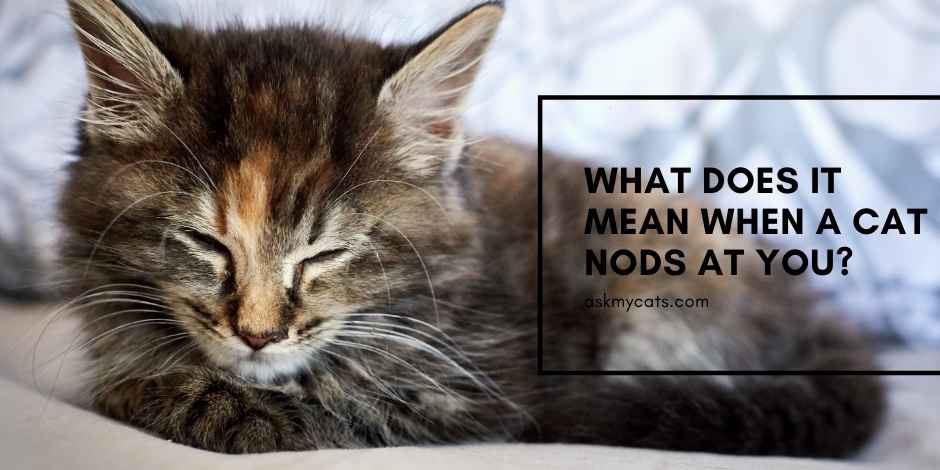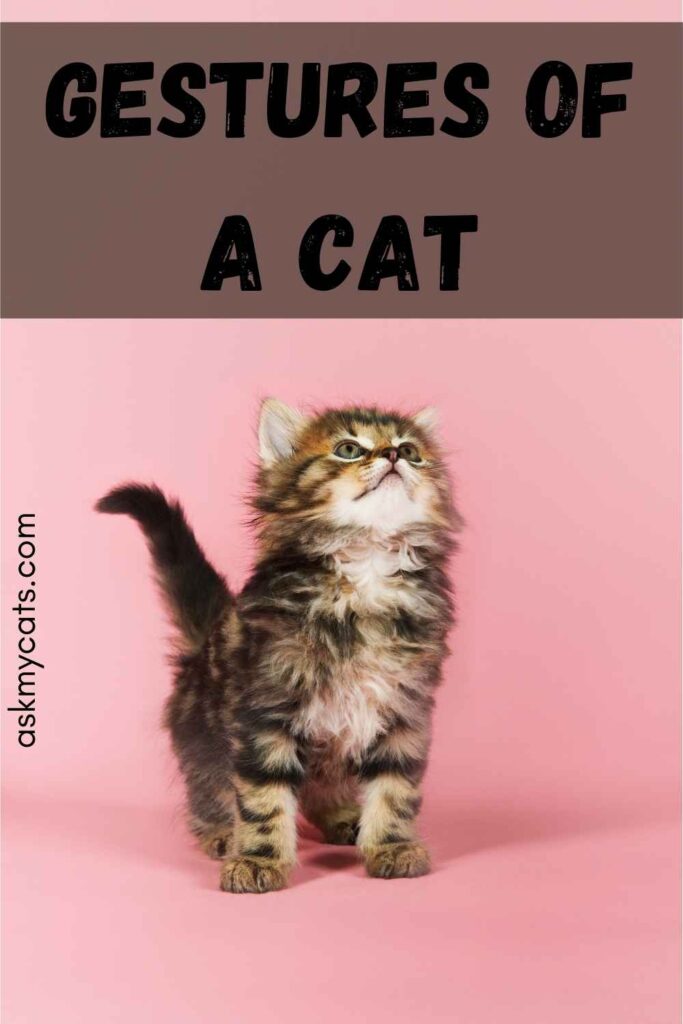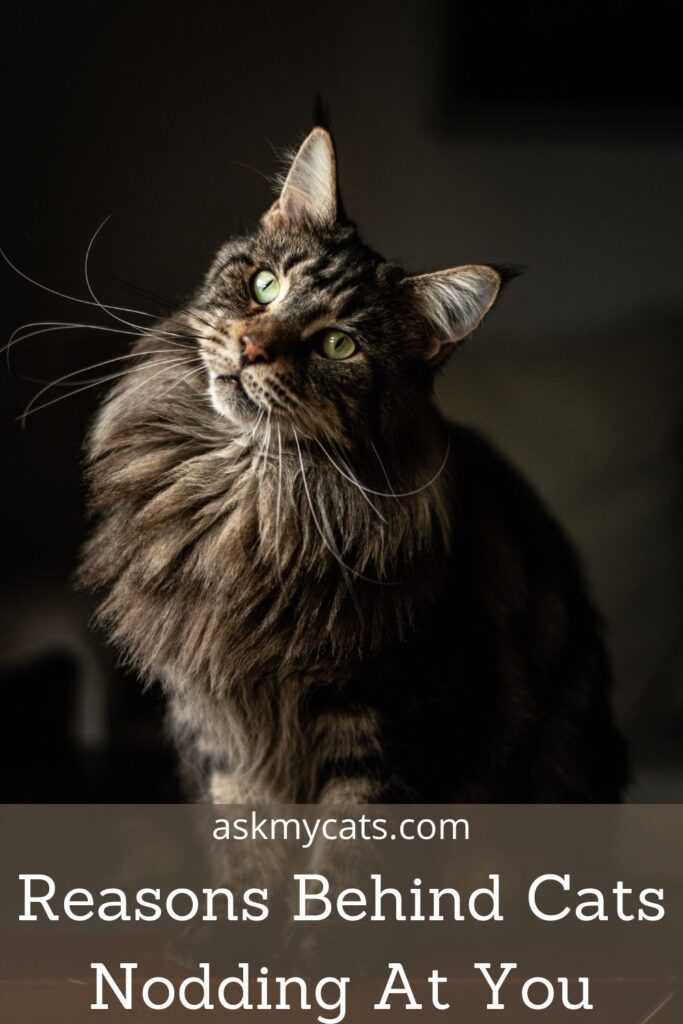Your cat hasn’t instantly been accommodating if she starts nodding her head.
Cats nod their heads for a variety of motives, some of which are known, others of which are unknown, some of which are innocent and some of which are more extreme.
If your cat is nodding her head on a regular basis, take her to the doctor and find out what’s behind it and how to handle it.
Your cat is nodding and meowing as a welcome or as a plea for your undivided attention. Since they want to play and you’re on the move, you’re considered transient prey. In comparison, cats often hide and reach out to ‘catch’ you in a game of hide-and-seek.


Give Your Cat the Perfect Day
Get the Free Ebook!
GESTURES OF A CAT

Finally, cats make a variety of movements that are highly communicative.
Kneading is the method of kneading ingredients together. This is a hangover from when I was a kitten.
A breastfeeding kitten massages its mother’s belly to stimulate milk flow. To show that it is happy, an adult cat can knead the person who is keeping it.
This can be a frustrating experience if the cat’s claws are sharp!
And if there’s nothing to knead, a contented cat will periodically stretch and curl its toes (and extrude and retract its claws) while purring.
A cat that rubs its nose and cheek against you is marking you and showing that you are its property.
A cat that arches towards you, often even jumping up on its hind legs, is begging to be petted or picked up. When a cat flops against you, it’s a show of faith.
When your cat butts the top of its head against yours, it’s pure love.
Cats can groom and even bite their owners on occasion. An adult cat grooms a kitten and often holds it by the nape to make it stand still.
What Leads To Cat Head Bobbing While Playing?
Your cat could be bobbing his head for a variety of causes, both known and unknown. He may, for example, have ear problems caused by eat mites or wax build-up. Of fact, he may have had an inner ear infection as well.
Genetics is another cause your cat could bob his head. If your cat was rescued from an animal shelter, though, they will not be aware of his complete medical background.
Is your cat on some prescription or over-the-counter medication? If that’s the case, he may have had an allergic reaction.
A neurological problem will be the most significant cause.
If your cat starts to bob his head, please take him to the doctor, who will make an accurate diagnosis and recommend the right treatment options.
Reasons Behind Cats Nodding At You

1. Hearing Issues
Anything as plain as ear mites or fleas may be the source of your cat bobbing and shaking her head.
The nasties will get into your cat’s head, causing scratching, pain, and even infection.
Other ear problems, such as an ear infection or cancer, may be the culprit if there is no risk of a pest problem.
Your cat’s equilibrium can be thrown off if she has an inner ear infection, in which case her head bobbing may be followed by other signs such as vomiting and bending toward the side where the problem is occurring.
2. Genetic Makeup
If your cat experiences head tremors, her genetic background will play a role. Purebred gene pools are often insufficiently diverse to keep cats healthy.
A strong example is a genetic condition that affects Burmese cats and causes neck muscle fatigue, which contributes to head nodding.
3. Adverse Drug Outbursts
Drug reactions or overdosing in cats can result in not only head bobbing but also full-fledged seizures. Your pet may have a bad reaction to a widely used cat drug, but if you give your cat a medication that isn’t licenced for felines, severe side effects are possible.
Pseudophedrine and ephedrine, for example, are over-the-counter medications that you already have on hand, so don’t give them to your cat if he has the sniffles.
To a cat, any amount of pseudophedrine is an injection that can cause her head to bob, as well as speed up her pulse, raise her blood pressure, and cause vomiting.
Drug reactions and seizures are dangerous and can lead to death, please take your pet to the vet as soon as possible.
4. Brain Problems
Brain abnormalities in cats can cause head bobbing, and the reasons differ.
If your cat was struck by a vehicle or dropped and hit her head, for example, she may be suffering from brain damage, with symptoms such as head bobbing.
Signs of infection in the brain, as well as irregular or underdeveloped brain tissue, include head shaking. Your pet would not have a head-bobbing disorder if the problem is in how the brain evolved.
She’ll have had the symptom when she was 6 weeks old. An infection, malnutrition, or contaminants contracted or encountered when Mama Cat was pregnant can cause a birth defect in the brain.
Kittens born with such brain defects will survive as long as any other animal, but they may take special treatment and treatment due to their developmental disabilities.
5. Intolerances
Cats, like humans, can be allergic to a variety of items.
Allergies in cats can be caused by touch, inhalation, food, or insects (particularly flea bites), and they typically manifest as excessive scratching around the head, body, and ears, as well as head shaking.
Your veterinarian can recommend anti-itch drugs, but he or she will also attempt to identify the allergen.
Regardless of your cat’s risk for fleas, they will want to put him on a new monthly topical flea prevention. To run a strict food experiment, they will choose to move your cat’s diet to a prescription, hydrolyzed food.
None but the recommended food will cross your cat’s lips for six to eight weeks during the food trials. Treats, people food, and flavoured supplements all fall under this group.
Successfully completing a diet experiment will definitively diagnose whether or not your pet benefits from a food allergy whether you are able to continue with it and whether it is what the veterinarian recommends.
6. Bites from Insects
Cats, as natural predators, are vulnerable to insect bites, which usually affect the face and paws. Swelling, inflammation, scratching, hives, and head shaking are also possible symptoms of a localised bite response in certain cats.
If your veterinarian thinks your pet was bitten by a bug, antihistamines or steroids might be used to reduce inflammation.
In rare cases, the cat can have an anaphylactic response, which necessitates emergency health care.
Ear polyps, also known as feline inflammatory polyps, are a common disease in animals.
These benign growths begin in the middle or outer ear mucous membranes of cats. Coughing, sneezing, head tilt, drooping eyelid, ear inflammation, or nasal discharge are some of the signs of an ear polyp, which varies depending on where it is found.
Surgical removal is the best way to successfully cure polyps.
7. Hematoma In The Ear
An aural (ear) hematoma, also known as ‘pillow ear,’ isn’t so much a cause of head shaking as it is something that can develop as a result of it.
The ear pinna (flap) includes a variety of tiny blood vessels, and if a cat (or dog) shakes their head hard enough for some cause, one or more of these blood vessels will burst.
The pinna fills with blood and takes on a puffy, pillow-like look as this happens.
If your pet experiences an aural hematoma unexpectedly, your veterinarian will be able to negotiate medical choices with you and help you decide which is safest.
If your doctor agrees your cat is a good candidate for it and the fluid isn’t causing too much pain, they can opt to drain it.
Since there is now an empty room, the fluid is likely to re-accumulate; thus, your veterinarian can prescribe steroids to minimise inflammation, bandage the ear, or use cold laser treatment to try to avoid this. If your vet prefers this treatment option, your cat’s ear can crinkle when it heals.
This is simply an aesthetic problem and will not affect your cat’s welfare. Furthermore, others may say that it adds character. If your cat’s hematoma is more serious, your veterinarian can recommend surgery.
If this is the case, the veterinarian will make an incision to remove the blood, and then suture the pinna together in a pattern that prevents it from filling up again until it has a chance to scar and heal.
If the vet opts for a cosmetic fix, crinkling of the ear is a less frequent care risk.
Frequently Asked Questions
What does it mean when a cat nods?
If they nod while meowing, it may be a greeting or a request for your undivided attention. If your cat blinks while shaking his head, he’s saying something along the lines of “Hello, I love you!” While the meowing may mean the same thing or suggest that he wants assistance from you.
Why does my cat bob his head at me?
Anything as plain as ear mites or fleas may be the source of your cat bobbing and shaking her head. The nasties will get into your cat’s head, causing scratching, pain, and even infection.
What does it mean when a cat hits you with their paw?
A cat is trying to get your attention and play with you. You are called transient prey because they want to play because you are going. In addition, cats will often hide and reach out to ‘catch’ you in a game of hide-and-seek.
Final Words
A cat’s head shaking can be caused by a variety of factors.
A real ear infection may not be the source of your cat’s head shaking, but even if it is, over-the-counter ear drops may not be appropriate with the form of infection your cat has and may cause adverse effects like deafness if the ear drum is weakened, so make an appointment with your usual doctor to have your cat’s head shaking evaluated.
Do let us know your part of the story in the comments section below!
